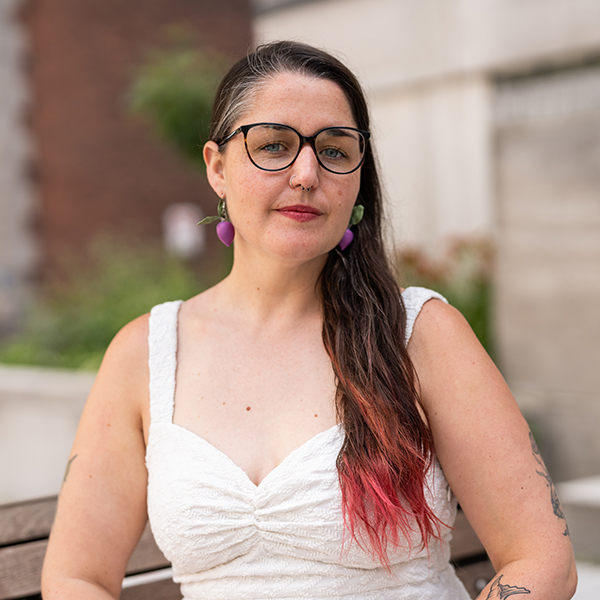Not every burger is created equal. To be great, a patty must excel in multiple realms: it should have a pleasant mouth-feel, attractive colouring, a craving-inducing aroma—and, of course, it’s got to taste fantastic.
A group of McGill food science students kept these factors in mind earlier this year when they strove to build a better burger as part of their Food Product Development course at Macdonald Campus. One of the biggest challenges? They didn’t want their patty to contain any meat.
“As food scientists we’re interested in keeping up with market trends,” says Rasha Dogmoch, BSc(FSc)’16, BSc(NutrSc)’16, one of the team’s members. “We noticed more people are becoming flexitarians—they like meat, but want to eat less of it. We aimed to reflect that.” And they succeeded. Dogmoch and her team created a convincing meat analog called Rephyll.
A team of McGill food science students developed the Rephyll plant-based burger, for “flexitarians” who like the taste and feel of beef, but want to eat less meat
Rephyll wasn’t the only innovative new food to make its debut during that Food Product Development course.
Another student team created Fitamin Multimeal, a ready-to-eat stew that incorporates eggshell powder to deliver essential nutrients—namely calcium—to women in Yemen. There, calcium deficiency during pregnancy is a primary cause of maternal death, and a risk factor for nutritional rickets, which affects more than half of Yemeni children.
Last month, the two McGill teams of young food developers entered their creations in the International Food Technologists annual competition in Chicago, the world’s largest gathering of food science professionals. Students from across the world take part in the event. Both McGill teams took home top prizes – the second year in a row that students from the Food Product Development course accomplished that remarkable feat.
Dogmoch and her colleagues snagged first in the IFTSA & Mars Product Competition. The Fitamin team placed first in the Developing Solutions for Developing Countries portion of the competition.
Anne Frazer-McKee, BSc(FSc)’16, one of Fitamin Multimeal’s developers, says the product is inspired by a popular Yemeni stew called Saltah. Aside from providing 130 percent of the daily recommended intake of calcium, the recipe for Fitamin Multimeal also supplies high levels of vitamin A, vitamin D, iodide and zinc.
Both foods were devised under the watchful eye of Salwa Karboune, the associate professor of food science and agricultural chemistry who teaches food product development. Each year, course participants are pushed to think outside the box.
“I let my students dream,” Karboune says. “I tell them, ‘This is only time you’ll be able to develop a product without any constraints.’ When you work for a real company you have financial and [other] barriers.”
 A McGill team of food science students created a nutrient-rich ready-to-eat stew to address malnutrition issues in Yemen. The stew can also be baked into a flatbread.
A McGill team of food science students created a nutrient-rich ready-to-eat stew to address malnutrition issues in Yemen. The stew can also be baked into a flatbread.
This freedom allows students to cook up foods that they can feel good about.
Frazer-McKee says the project was an eye-opening experience for her and her group members. “We’ve become interested in food security,” she says. “While we’re throwing out food in North America, families in Yemen are hoarding it because they have so little.”
Dogmoch says her teammates changed their eating habits once they started to look deeper into the environmental impact of farming beef. “I make a concerted effort not to eat meat twice a week,” she says. “Working on this project really solidified for me that the future of food lies in plant-based products.”
Another upside to these plant-based foods, she says, is the opportunity to develop meals with a higher nutritional value. After their research revealed that 85 percent of Americans don’t consume enough vegetables on a regular basis, Dogmoch’s team made it a priority to ensure that people get the vegetable-based nutrients they need. A single Rephyll patty contains 65 percent of the recommended daily vegetable intake. That adds up to a cup and a half of vegetables.
Both teams’ newly developed products rely largely on natural ingredients. Rephyll includes mushrooms, textured vegetable protein and beet pulp; Fitamin Multimeal includes lentils, tuna, tahini and a mix of Yemeni spices.
This, says Karboune, reflects larger food industry trends. “These days, consumers are much more demanding of their food products. They want a clean label, nutritional value, no chemicals or colorants,” she explains. “It’s very challenging. We need creative, innovative people in food product development.”
Her course is helping to produce some of those people.
Frazer-McKee and her team (which included Mingduo Mu, Jun Xin Ong, Tamao Tsutsumi, Sonia Périllat-Amédée, and Emily Mason) hope to be able to produce Fitamin in Yemen one day. They want to create jobs and boost the country’s economy by manufacturing the stew locally. They’ve contacted a professor in Yemen who is eager to collaborate, and are attempting to connect with food companies there.
Dogmoch’s team (which included Adam Maxwell, Qui Yi Sun, Caroline Lafleur, Anna Cavalieri, Patrick Liu and Christopher Zhang), for its part, also hopes to introduce Rephyll to the market—eventually. Getting a new food product onto grocery store shelves can take years. But the early word-of-mouth is promising. The Rephyll team held a promotional campus barbecue earlier this year, serving up their meat-free patties. Curious, but wary samplers tried a mouthful. Then most came back for seconds.


